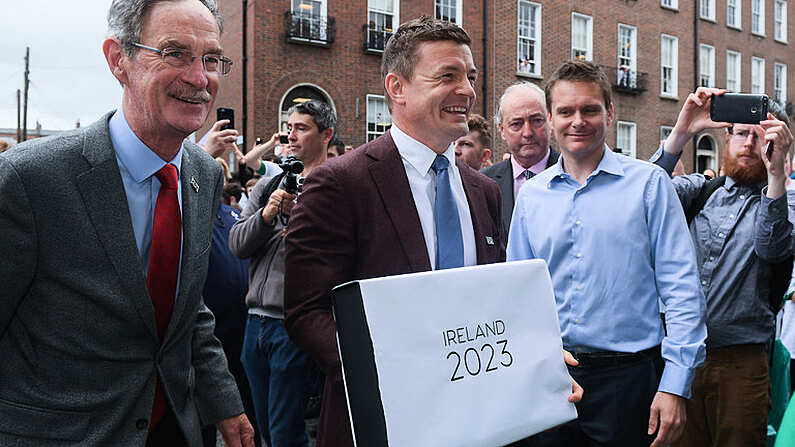Ireland's hopes of hosting the 2023 Rugby World Cup lie in shards about our feet. Following an exhaustive technical review, World Rugby have endorsed South Africa as the preferred host of the tournament. France were rated second, with Ireland bottom.
An explanation behind this process has been published in a lengthy, 220-page document by World Rugby, which details each bid and, more importantly, where each bid fell down. Balls have seen this document, so here are some of the reasons why Ireland's bid looks like it will be unsuccessful.
How it worked
First of all, a brief explanation on how it all worked. Each nation was rated under five criteria, each of them weighted differently. They are Vision and Hosting Concept (10% weighting), Tournament, Organisation and Structure (5%), Venues and Host Cities (30%) Tournament Infrastructure (20%), and Finance, Commercial, And Commitments (35%).
Ireland finished bottom in all but one of these criteria, the outlier being the tournament vision, where we finished second to France.
Here is how the final score turned out, following the criteria-based scoring.

Here are some of the issues raised by the review committee in relation to Ireland's bid.
Money
In truth, this is probably the biggest factor. Much had been made of the fact that France were willing to offer more money ( an extra €30 million) on top of the €120 million tournament fee that must be paid to World Rugby to host the tournament. Ireland pointed out that this would be merely underwritten by the French government, inherently more risky than the fact that our government were willing to pay the full thing themselves.
As it happens, South Africa came up trumps for World Rugby on both counts: they have gazumped everyone with a €160 million fee, which will be paid by the South African government.
The fact that most stadiums need to be updated
South Africa stole a march on Ireland and France in regard to their "venues and host cities", given most are grand buildings lying idle since the 2010 World Cup.
The committee found fault with the fact that many of the stadiums chosen would require upgrade work so as to be suitable to host the tournament. It found that "all but two of the venues require significant levels of upgrade and/or installation of telecommunications infrastructure". This, they said, "introduces complexity and therefore a significant risk factor that is not inherent in the other two bids".
Specific concerns were aired about Páirc Ui Chaoimh (while newly developed, it would need to be adapted to all-seater to host a quarter-final), Casement Park, Pearse Stadium, and Fitzgerald Stadium.
The fact that Ireland has not hosted so big a tournament before
The Rugby World Cup would have been the biggest competition to visit these shores, which ultimately made the committee antsy about our ability to host it without a hitch, issues not afflicting France nor South Africa.
The Irish bid pointed out that we have successfully hosted major events like the Women's Rugby World Cup, The Ryder Cup, European club rugby and football finals, the Giro D'Italia and the Volvo Ocean Race, but this, the committee concluded, is not on the scale of their international jamboree.
The review deduced that:
Whilst collectively these events constitute significant and varied hosting experience, Ireland has not hosted a major international sporting event of a similar stature, scale and complexity to Rugby World Cup...
... The hosting of four matches in Dublin as part of the UEFA EURO 2020 tournament will likely assist in building major
event experience in Ireland. World Rugby has confidence from Ireland’s bid that the OC structure would include experienced major event personnel, but a level of risk does arise from the overall lack of comparable event hosting experience across the venues, cities and relevant local authorities.This therefore reduces Ireland’s score in this area relative to the significant experience of France and South Africa.
This, along with the second point, shows that Ireland were hamstrung by the fact that we haven't hosted a major football tournament before.
Killarney is too small
Poor Killarney! When giving their take on Ireland's host cities, the review deduced that while Dublin, Belfast, Cork, Limerick, and Galway were up to scratch, Killarney "is not sizeable (14,000 population), with less experience in large-scale international events". Given the town is a veteran of the Irish Open, this seems particularly harsh.
The Fan Zone proposals were not unique
Fan Zones, you'd imagine, would be an Irish wheelhouse. Not so, per the report.
The strategy meets RWC’s requirements in relation to location, capacity, safety, operational efficiency and commercial deliverables and there are no identified restrictions that may compromise the delivery of tournament obligations.
It does not, however, outline any innovative ideas or plans that might make the fan zone delivery unique.
Compare this to what France have offered:
All host cities have existing fan zone locations that offer a unique concept such as the ‘Prado Beach’ seaside fan zone in Marseille or Toulouse’s ‘beach event’ and ‘Fan Embassy’ in its central square.
And South Africa:
There is also an innovative concept in relation to the international fan zones. Seven international fan zones were utilised in 2010 [for the FIFA World Cup] and added another layer of engagement to the tournament. The bid also outlines the event strategies for each of the host cities.
South Africa have evidently found great success in reheating old proposals to FIFA.












